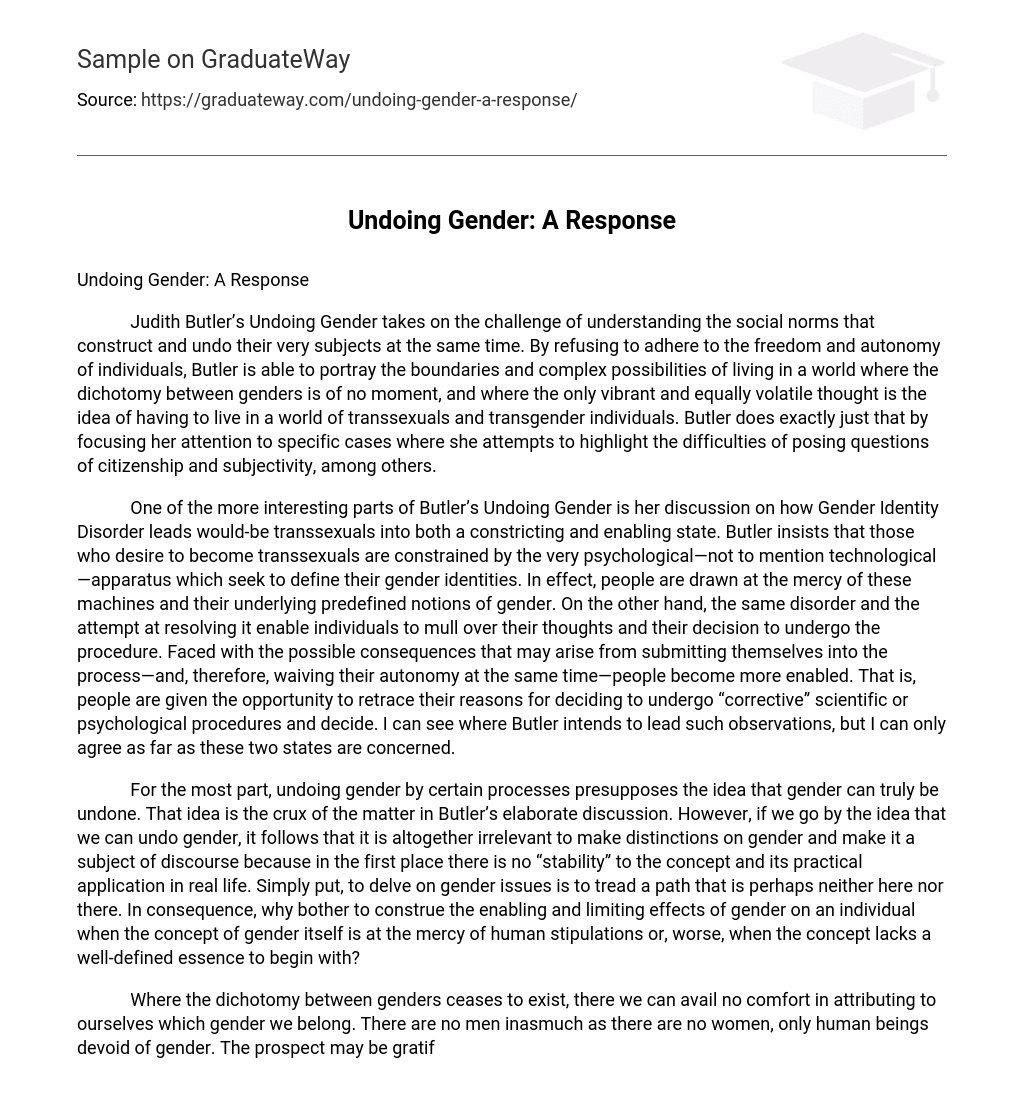Judith Butler’s Undoing Gender takes on the challenge of understanding the social norms that construct and undo their very subjects at the same time. By refusing to adhere to the freedom and autonomy of individuals, Butler is able to portray the boundaries and complex possibilities of living in a world where the dichotomy between genders is of no moment, and where the only vibrant and equally volatile thought is the idea of having to live in a world of transsexuals and transgender individuals. Butler does exactly just that by focusing her attention to specific cases where she attempts to highlight the difficulties of posing questions of citizenship and subjectivity, among others.
One of the more interesting parts of Butler’s Undoing Gender is her discussion on how Gender Identity Disorder leads would-be transsexuals into both a constricting and enabling state. Butler insists that those who desire to become transsexuals are constrained by the very psychological—not to mention technological—apparatus which seek to define their gender identities. In effect, people are drawn at the mercy of these machines and their underlying predefined notions of gender. On the other hand, the same disorder and the attempt at resolving it enable individuals to mull over their thoughts and their decision to undergo the procedure. Faced with the possible consequences that may arise from submitting themselves into the process—and, therefore, waiving their autonomy at the same time—people become more enabled. That is, people are given the opportunity to retrace their reasons for deciding to undergo “corrective” scientific or psychological procedures and decide. I can see where Butler intends to lead such observations, but I can only agree as far as these two states are concerned.
For the most part, undoing gender by certain processes presupposes the idea that gender can truly be undone. That idea is the crux of the matter in Butler’s elaborate discussion. However, if we go by the idea that we can undo gender, it follows that it is altogether irrelevant to make distinctions on gender and make it a subject of discourse because in the first place there is no “stability” to the concept and its practical application in real life. Simply put, to delve on gender issues is to tread a path that is perhaps neither here nor there. In consequence, why bother to construe the enabling and limiting effects of gender on an individual when the concept of gender itself is at the mercy of human stipulations or, worse, when the concept lacks a well-defined essence to begin with?
Where the dichotomy between genders ceases to exist, there we can avail no comfort in attributing to ourselves which gender we belong. There are no men inasmuch as there are no women, only human beings devoid of gender. The prospect may be gratifying on the part of the likes of Butler, but certainly it attacks one of the core foundations of human civilization, which is individual identity. While we can dispose of gender roles since they limit the very possibilities of human capacities insofar as human relations is concerned, it also rids us of the benefit of knowing who we are as an individual in a vast society. By virtue of possessing a gender identity, we can at least proceed with the task of critically assessing if whether or not we are who we presume ourselves to be. Without a gender identity at the onset, we barely have anything to examine and renounce when inconsistencies and faulty awareness arise. These things being said, Undoing Gender serves its aim of providing a hypothetical situation where people need not abide with gender restrictions. At the same time, it also seeks to dissolve our notions towards gender, thereby preempting us from taking the first step towards gender enlightenment.
Work Cited
Butler, Judith. Undoing Gender. New York: Routledge, 2004.





